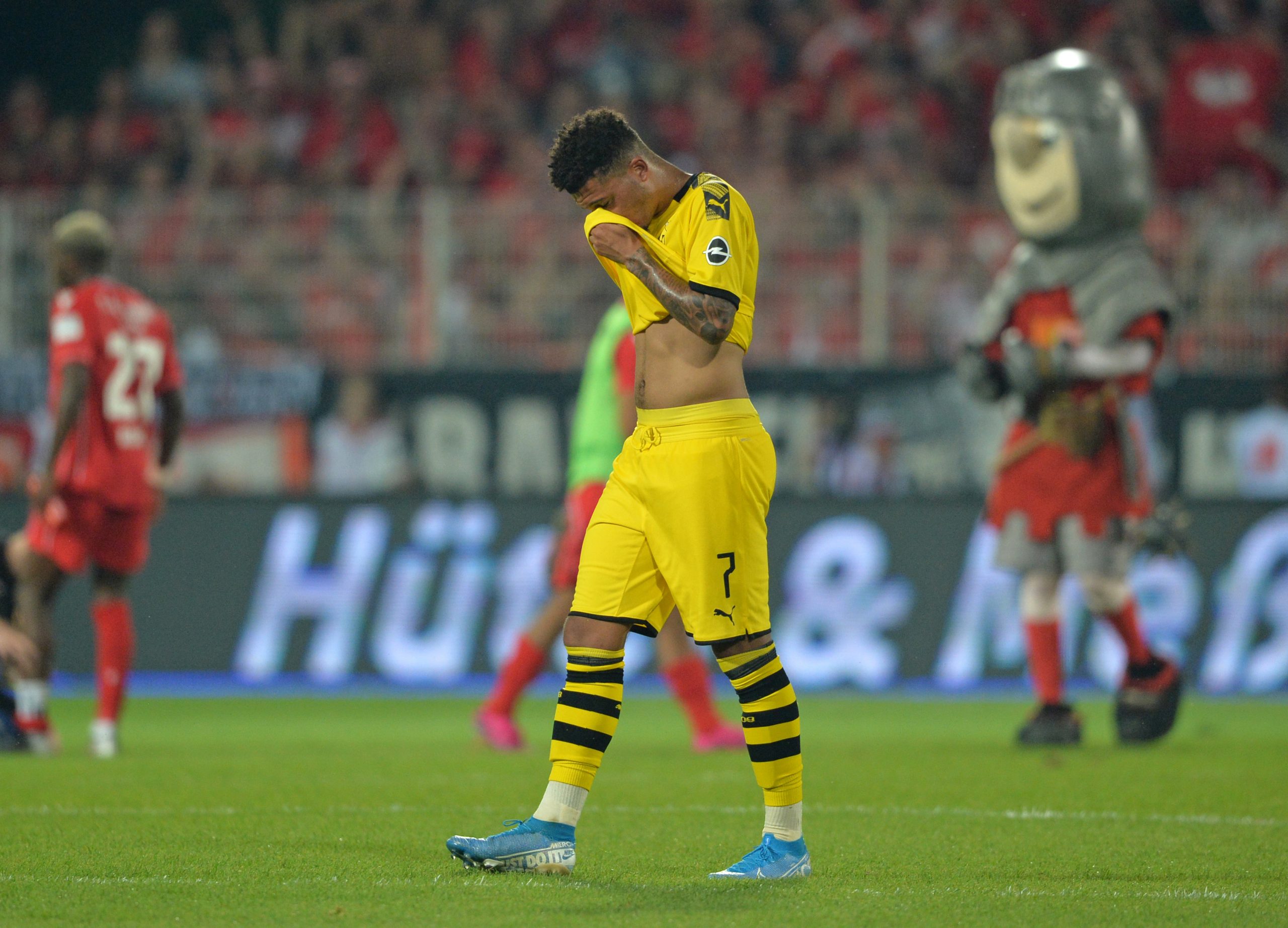Almost a year ago, a relieved-looking Hans Joachim Watzke was rushing through the Bayer Leverkusen mixed zone. A few Dortmund writers asked the Borussia Dortmund CEO about the remarkable come from behind 4-2 victory. Upset about the perceived media criticism of a difficult start he brushed us off saying, “I’m not talking to you guys after the stuff you wrote earlier." It was a forgotten nugget of a season-defining match.
On that late September night in the BayArena, Dortmund put up 0.18 expected goals in the first half and were inches away from being 3-0 down, as Kevin Volland’s early second half effort hit the post. Lucien Favre’s decision to bring on Paco Alcacer for Maxi Philipp and Jadon Sancho for Christian Pulisic turned the match around and BVB emerged with a 4-2 victory. The rest with Marco Reus, Paco and Sancho running over the Bundesliga for much of 2018-19 is, as they say, history.
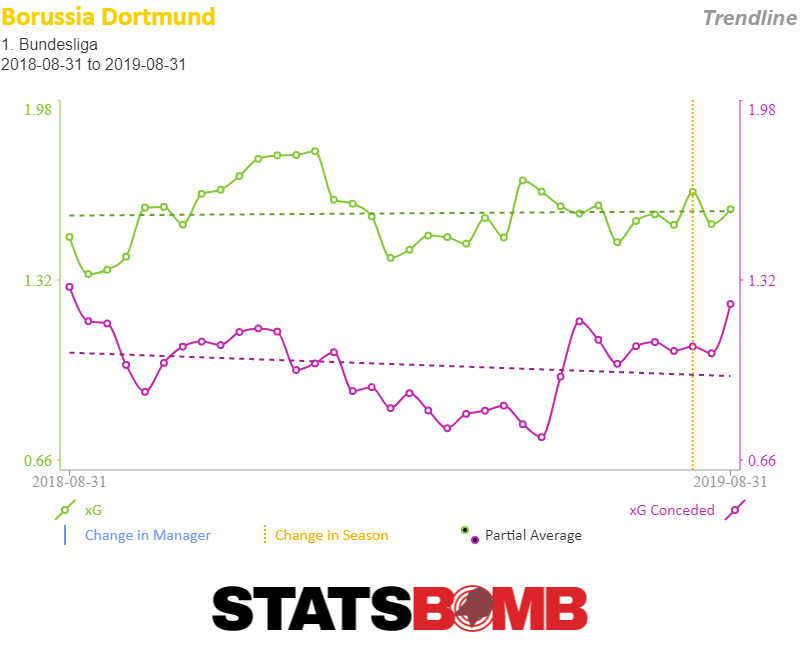
History, to continue with the cliches, is written by the winners, and Dortmund’s breakout campaign ended with a spring flameout. The team blew a nine point lead to Bayern Munich, who also threw in a five goal shellacking in April as a knockout punch to secure the title.
Yet, a Bayern transfer window that can be best described as initially promising (Benjamin Pavard, Lucas Hernandez) turned into a whole lot of emergency plan S (for Leroy Sané) type signings (Ivan Perišić, Philippe Coutinho, Mickaël Cuisance). Pitted against Dortmund’s perceived incredible window, weakening Bayern by bringing back Mats Hummels on top of adding Nico Schulz, Thorgan Hazard and the aforementioned Brandt, had experts and fans (49% of the 105k people asked by Kicker picked Dortmund vs 37% Bayern) putting BVB ahead of Bayern.
Has Dortmund's spring slump persisted?
It certainly started out well for BVB, outexecuting Bayern in a sloppy SuperCup with only Schulz playing. The Bavarians dropped points at home to Hertha, while Dortmund easily overcame a goal conceded in the first 30 seconds against Augsburg to win 5-1.
Then came the warning signs: the dreaded set piece goal conceded against Bundesliga returnees Cologne, whose intense pressing held Dortmund to 0.2 xg for 53 minutes. That is, until Jhon Cordoba got hurt. The Colombian was tasked with pressing Mats Hummels out of the buildup and succeeded for 55 minutes. That resulted in the artist formerly known as Julian Weigl (yes, that hurt me to write) and Manuel Akanji trying to bypass pressing lines with little success. It was only when Favre introduced and positioned Julian Brandt a good 10-15 yards higher up the pitch alongside Marco Reus in a double 8/10 hybrid role, that Dortmund blew away the hosts.
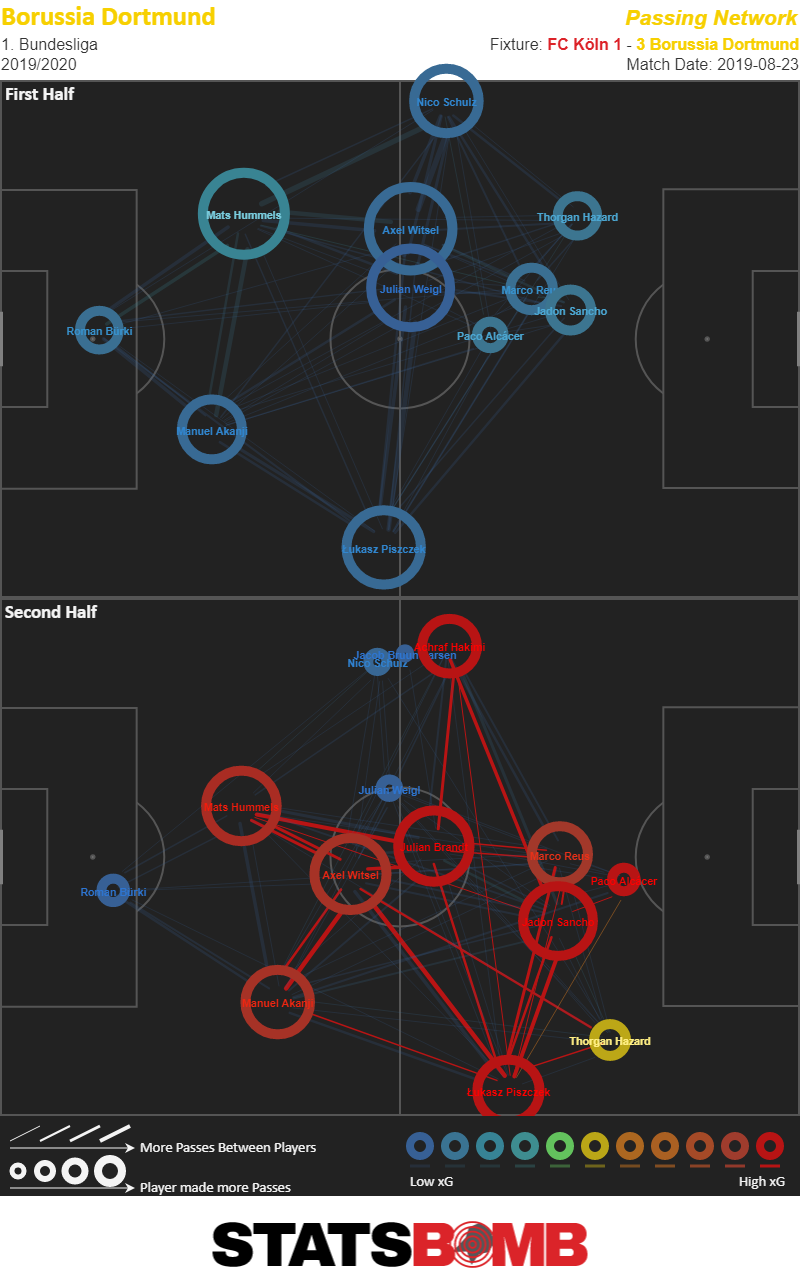
The 4-3-3 with Brandt and Reus as the attacking midfielders was something many of us who follow BVB closely had wanted to see ever since the ex Leverkusen man was announced. Brandt’s exceptional intelligence, the vibrant Sancho combining with Paco and Reus against the tiring Cologne players was a winning formula. That second half pass map heated up faster than the freakishly athletic Achraf Hakimi can sprint down the wings.
Post-match, the narrative shifted from Dortmund’s unresolved issues vs deep-sitting teams to Favre’s subs and settled on “with Brandt, Dortmund can just turn it on whenever they want to." The danger with that flip the switch mentality is that sometimes the switch does nothing. Against Union Berlin, Dortmund played a good first half, but converted just one of a couple of big chances and conceded the “usual” corner goal. Without Axel Witsel and Thorgan Hazard, Favre had two major problems. First, the Swiss coach had to deploy Brandt as an inside-roaming left winger, rather than a central attacking midfielder, which resulted in a whopping 19 failed passes and left Favre with the Mario Götze - Raphael Guerreiro duo “of guys who wanted to leave Dortmund in the summer, but are staying” as creative bench options. Götze remained on the bench in favor of Jacob Backwards-passing Larsen for reasons unknown.
Secondly, sans Witsel, the playmaking was to come from the defensively sound, but methodical Thomas Delaney alongside the metronomic Weigl, which is a pairing that was as uninspiring as it sounds. Thus, Mats Hummels attempted 69 first half passes, 15 into the final third, and succeeded to break several pressing lines on a few key occasions in the first half.
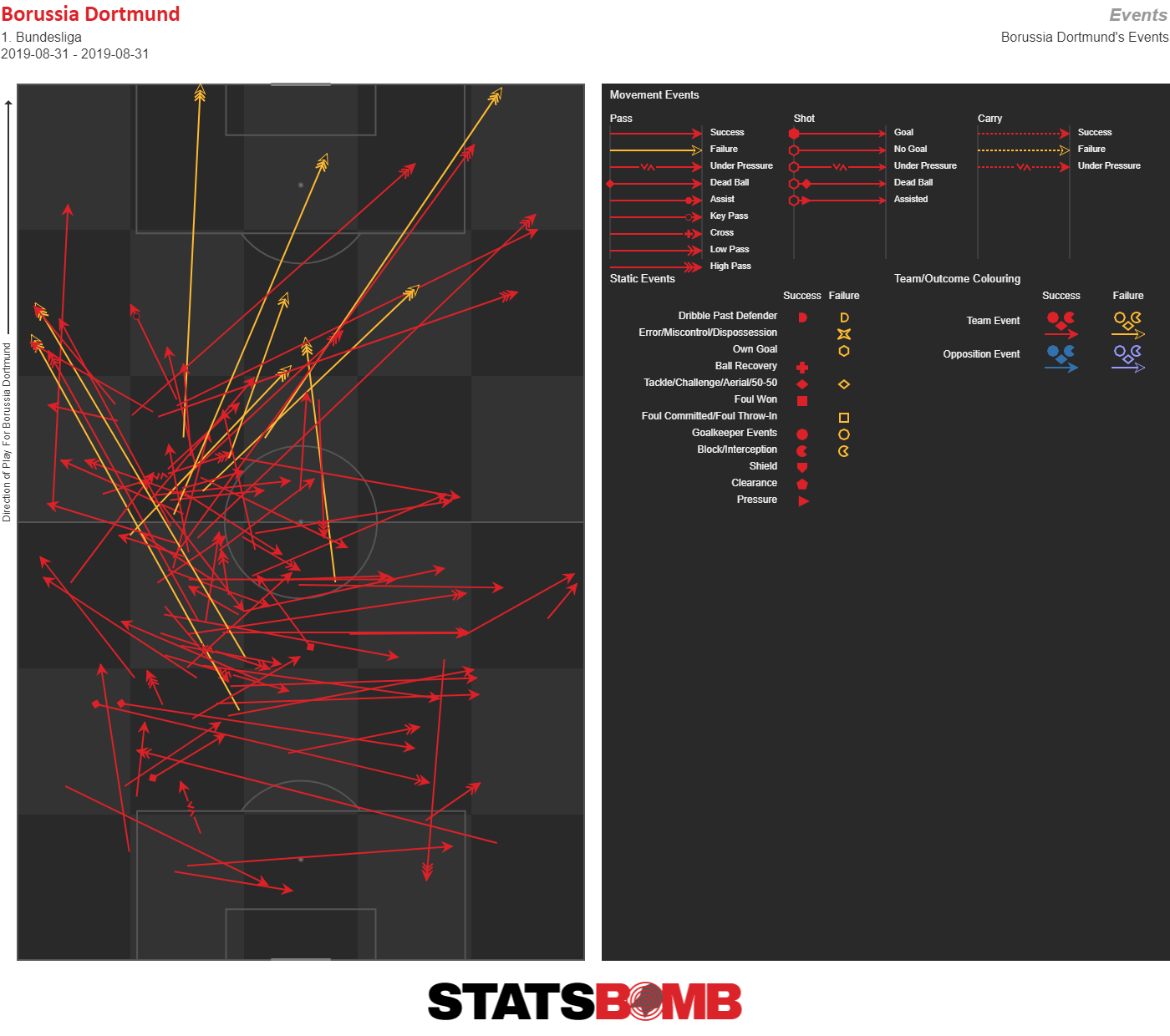
Delaney, meanwhile, had three final third comps with Weigl chipping in twelve. Things improved when the concussed Delaney was replaced by, Mo Dahoud, who completed 51 of his 53 second half passes including 13 of 15 in the final third. Still, in the second half, Dortmund only created 0.20 expected goals and despite having the vast majority of the ball got out shot nine to six by a team playing its third ever Bundesliga match. Those numbers are alarming, especially because since the great Ashwin Raman breakdown, we know how much Favre uses possession for defensive purposes and it really didn’t work.
“The Union match reminded me of the Rückrunde” said sporting director Michael Zorc, referring to the second half of last season, and that’s a perfect summary of BVB’s old struggles resurfacing: failure to improve and actually getting worse on set pieces, combined with inexplicable defensive lapses and the inability to break down compact teams when Dortmund have to play from behind, stemming from Favre’s overly conservative double pivot. All the reasons why Dortmund squandered away the Bundesliga title last season, with all due respect to Bayern’s excellent turnaround after November.
Favre’s sad set pieces
Lucien Favre is known for his meticulousness - he’s told Marco Reus that in order to beat a defender more easily he should watch their feet while he's dribbling, and also was concerned about Abdou Diallo running with clenched fists - but for such a stickler he is strangely indifferent about set pieces. It was the case during his Gladbach days of crushing xG models, though at Nice he had two seasons of conceding only seven and six set piece goals, perhaps the French Riviera even helps with that.
Last season, following the three set piece goals allowed in the Hinrunde, Favre’s Dortmund conceded a whopping ten in the spring, and they've already let in three after three matches in 2019-20. In short, defensively, they have gone from allowing 0.2 xG and being the second best team at defending set pieces to shipping 0.26 xG and 12th place to a ridiculous 0.45 xG conceded - one of the worst marks in the league this young season.
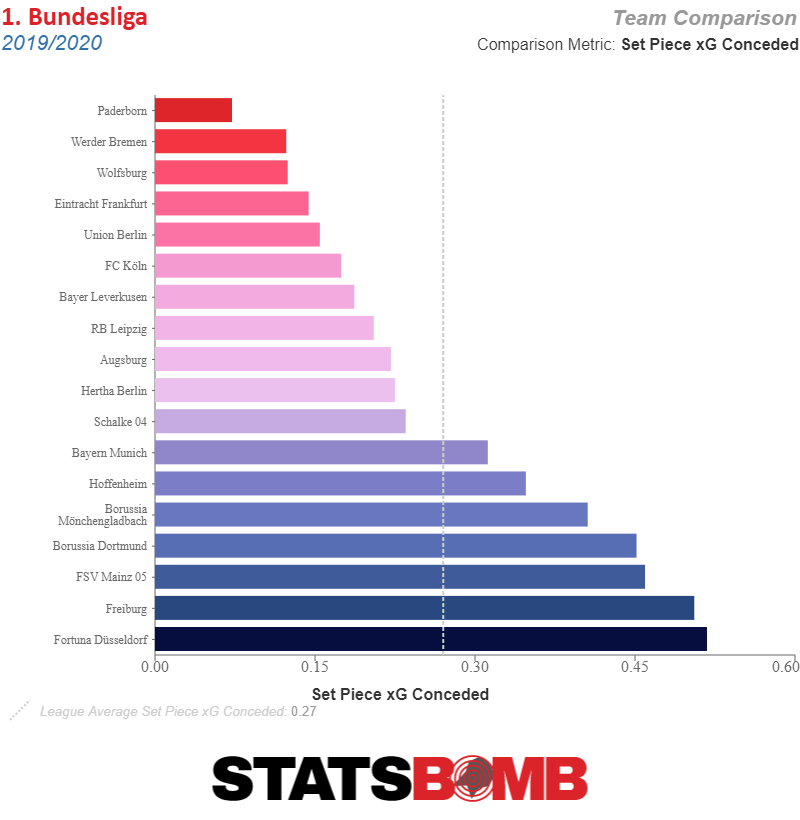
That’s quite the drop-off and without being inside the club, it’s hard to know why. Per sources, Dortmund supposedly practice set pieces, the responsibilities of co-trainer Manfred Stefes, more than once a week, having stepped up the work after the dismal spring results. It is, of course, possible that this is just a three game fluke, and will naturally correct itself, but on top of the longer term trend, it is, at the very least, worrying.
Just an 11 game mirage?
The post-game reactions from the Berlin loss were interesting. Aside from the predictable 180 degree turns by the media (preseason favorites BVB “won’t win the title now”) there reemerged, a strange disconnect, one which existed down the stretch last season, between Dortmunds’ management (Watzke) and players (Reus, Delaney)all announcing their title intentions and Favre picking Bayern as the favorites. Platitudes such as talking about needing to stay patient and concentrated and not give away dumb goals are not exactly doing much to calm the situation, though one does not exactly go to a Dortmund much expecting a spectacle at a Favre presser. The questions about whether Favre, a tactics obsessed, detail oriented “grey mouse” who turns mid-table teams into contenders for the Champions League places, has the personality to win the Bundesliga with Dortmund, are perhaps premature and unfair, for in some ways BVB fans will always want another Jürgen Klopp. But at the same time it’s telling that his contract which was to run down in the summer of 2020 was only extended for an additional year late June and given his messy departures at Hertha and Gladbach (where he quit after losing the first five league matches of the 2015-16 season), there should be some worries about his long-term future at Dortmund. In particular, because after 3 games, his Dortmund team looks more like a very good, but not a great team.
This may be a callous way of looking at his ultimately successful tenure - let’s not forget Favre followed the Bosz/Stöger disaster team that almost missed the Champions League - but when you take out the 11 game spike where BVB got 31 points, they are essentially the FOURTH best Bundesliga team over the last 22 games.
After the early difficulties, Bayern were always likely to catch up once Manuel Neuer actually decided that keeping the ball out of the net was a decent idea, though it is still likely that this is merely a great Bundesliga team and perhaps not yet a top contender for the Champions League title. Then there is Bayern’s next opponent, RB Leipzig, a that in a 20 game sample since January have taken 44 points vs. BVB’s 40. Last season under Ralf Rangnick, they essentially came away from the two matches against Dortmund with zero points and would have been right there if Roman Bürki had not saved multiple chances of RB to go up 2-0 in the season opener, while a brilliant but rare Witsel goal decided the return match.
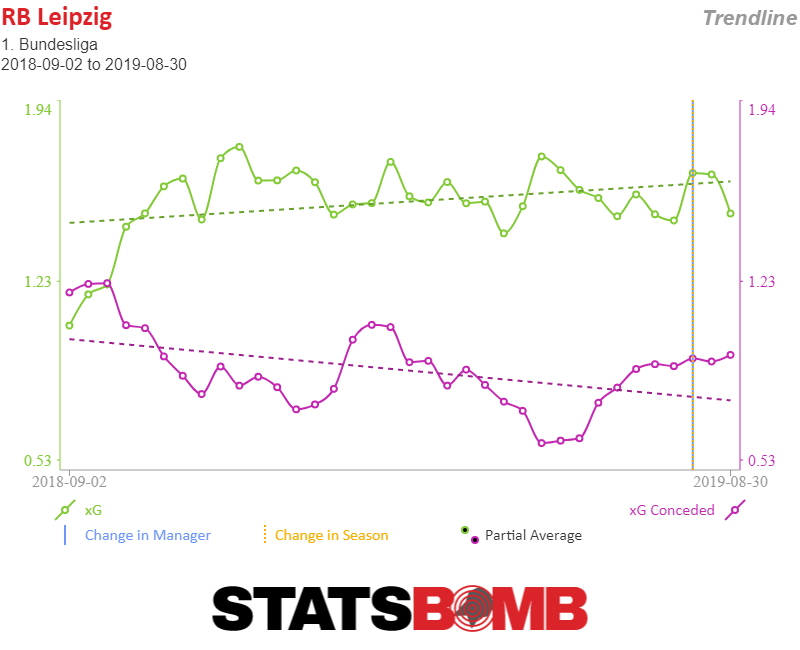
For now they’ve been perfect under new professor Julian Nagelsmann, who, along with Bayern’s lack of interest, managed to convince Timo Werner that attending the University of Nagelsmann is good for one’s soul as well as their attacking output. Testimonials by Andrej Kramaric, Ishak Belfodil, Sandro Wagner, Ádám Szalai are forthcoming.
Finally, Leverkusen’s trendline shows a clear example of what happens when you install a great manager in Peter Bosz. Seriously, the Boszwagon is opening that graph up like Julian Brandt carved up opponent defenses last spring. Since B04 fired Heiko Herrlich (about 12 weeks too late, but that’s beside the point), their xG looks markedly better than Dortmund's and they’ve also got 41 points to BVB’s 40 in the 20 game Bosz era. The extension talks of Bosz’ expiring deal are justifiably in the works.
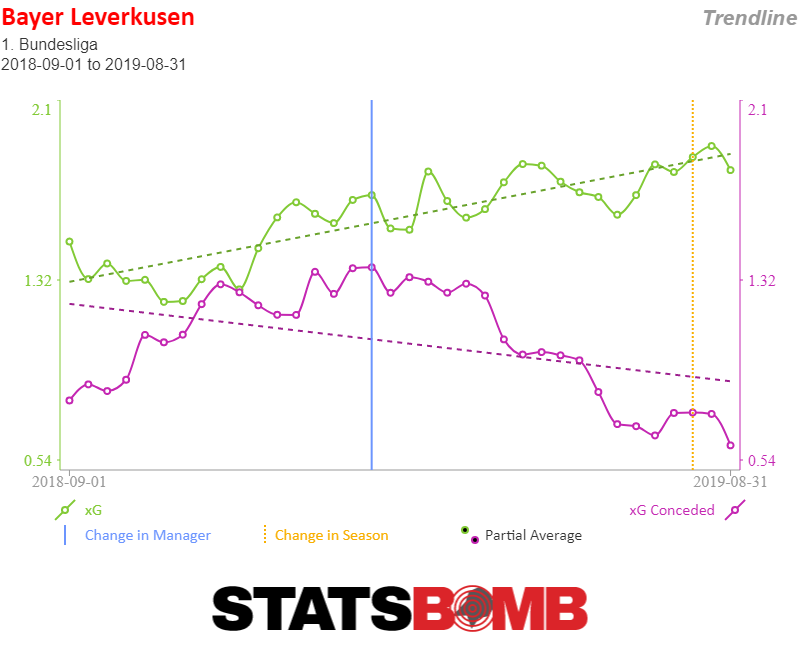 It’s only fitting that a year after that amazing 4-2 game and two years after Bosz’s lightning start with BVB, he faces his old team on matchday four. You better believe, he has had that match away to Dortmund circled in his calendar….
It’s only fitting that a year after that amazing 4-2 game and two years after Bosz’s lightning start with BVB, he faces his old team on matchday four. You better believe, he has had that match away to Dortmund circled in his calendar….
Header image courtesy of the Press Association
